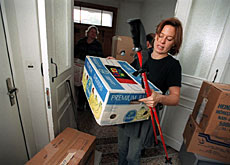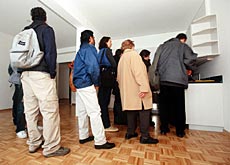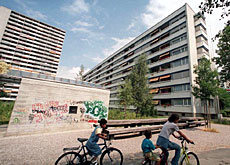Rent hike fears overshadow vote

Critics of proposals to reform Switzerland’s tenancy laws are warning the changes would lead to spiralling rents.
But the government says a “yes” in February’s nationwide vote could help ease the country’s housing shortage.
Under the proposals, rents would be linked directly to inflation rather than to the mortgage interest rate as they are at present.
Some 70 per cent of Swiss live in rented accommodation and there is a severe lack of available property, especially in Switzerland’s larger cities.
“The proposals certainly won’t change the situation overnight,” Peter Gurtner, a senior official at the economics ministry, told swissinfo.
“But in the medium and long term they should encourage more people to invest in new buildings and this could well help ease the housing shortage.”
Spiralling rents
But opponents of the proposed changes are urging a “no” vote when the Swiss cast their ballots on the issue on February 8.
They claim the changes would make it easier for landlords to force through rent increases and get rid of existing tenants just to profit from the chance of raising the rent.
“The proposals would mean that rents could be increased in line with inflation every time a new tenant moves in or when the ownership of a property changes hands,” Rudolf Strahm, president of Switzerland’s main tenants’ association told swissinfo.
“The new law is bound to lead to spiralling rents, and the general cost of living throughout the country will also go up,” he added.
On average the Swiss currently spend more than 25 per cent of their income on rent – a figure Strahm believes is likely to rise if the proposals become law.
Inflation
The government argues that the change would mean landlords could no longer raise rents every time mortgages rise, while failing to reduce rents when there is a drop in the rates.
“There has been a lot of talk in Switzerland over the past 20 years about severing the link between mortgage rates and rents,” Gurtner said.
“Everyone agrees that it’s time for a change, as rents on the whole have been increasing much more in real terms than they should have according to the general development of the economy.”
Transparency
Gurtner insists the proposals would also make the rental law simpler and more understandable and would protect the interests of both tenants and landlords.
But that is not a view shared by Simonetta Sommaruga of Switzerland’s main consumers’ association.
She believes the new law would actually take away some of the rights secured for tenants, and make it harder for them to challenge rent levels.
“At the moment a landlord has to prove that a particular rent is justified. If that’s not the case then the tenant could well get a reduction,” she told swissinfo.
“The proposals would make the whole situation less transparent and place the burden of proof on the tenant rather than on the landlord,” she added.
But Gurtner maintains that the aim of the law will still be to protect tenants from unscrupulous landlords.
Comparability
He also says tenants’ fears that landlords will be able to take unfair advantage of a new system that allows them to compare the rental value of their property with similar properties are unfounded.
There will not be a register to which tenants will be able to refer, as the government wants to avoid accusations of the state “fixing” an official rent limit.
But Gurtner says experience has shown that such comparisons, which take into account not just the size of a property, but also its location or its fittings ensure that rents are set at a fair level.
“It’s a difficult argument to convince people of,” he admitted.
“They [tenants] are always afraid that there is some sort of hidden manipulation going on, when in fact it’s nothing more than just a method of making sure rent levels are as comparable as possible.”
swissinfo, Jonathan Summerton
The Swiss currently spend around SFr60 billion annually on rented accommodation – the largest single household expenditure.
Some 70% of the population lives in rented accommodation.
In May 2003, the Swiss rejected centre-left Social Democrat-backed proposals that would have kept rent increases in check and imposed tougher restrictions on landlords.
The new proposals would link rents to inflation rather than mortgage rates.

In compliance with the JTI standards
More: SWI swissinfo.ch certified by the Journalism Trust Initiative


You can find an overview of ongoing debates with our journalists here. Please join us!
If you want to start a conversation about a topic raised in this article or want to report factual errors, email us at english@swissinfo.ch.